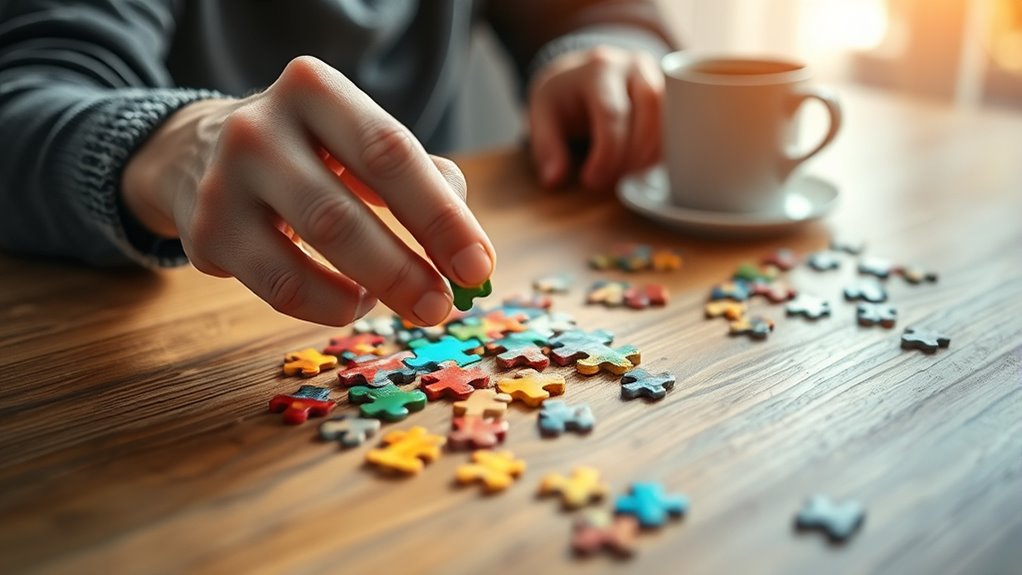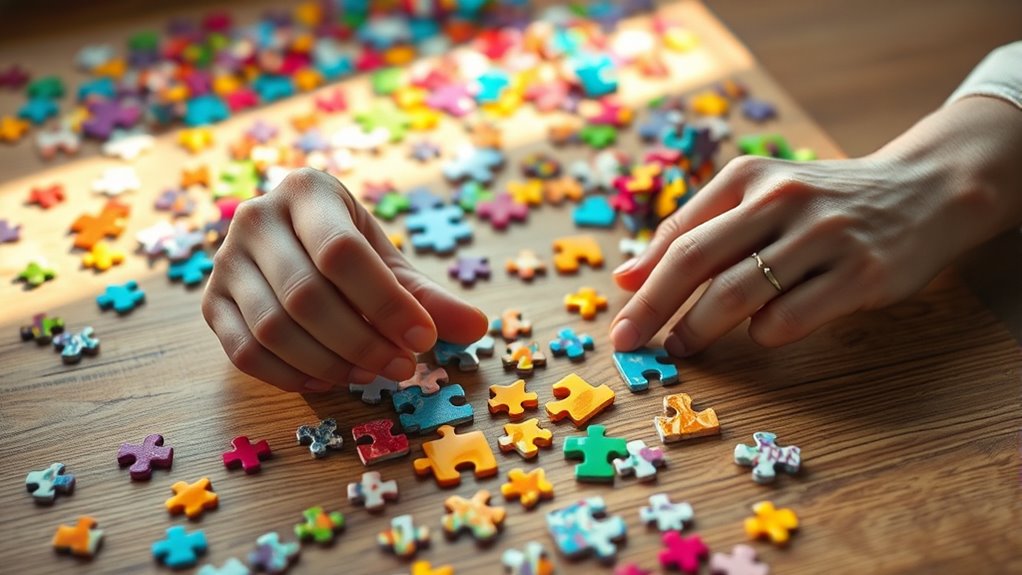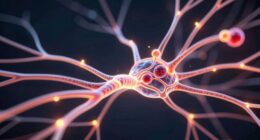You love solving puzzles because your brain’s reward system releases dopamine when you make progress, giving you a sense of achievement. Puzzles activate your pattern recognition skills, helping you find order in chaos and giving that satisfying “aha” moment. They challenge your creativity and mental flexibility, sharpening your thinking. As you progress, your memory and focus improve, fueling your motivation. Keep exploring, and you’ll discover even more about why your mind finds puzzle-solving so engaging.
Key Takeaways
- Puzzles activate the brain’s reward system, releasing dopamine and creating pleasure from achievement.
- Recognizing patterns in puzzles enhances cognitive skills like prediction, deduction, and problem-solving efficiency.
- Engaging with puzzles fosters mental flexibility, creativity, and adaptive thinking through strategic exploration.
- Pattern recognition provides a sense of order and mastery, satisfying innate cognitive drives for understanding.
- Solving puzzles offers mental stimulation, improving memory, focus, and motivating continued learning through rewards.

Have you ever wondered why solving puzzles feels so satisfying? It’s because your brain is engaging on a deep level, activating neural pathways that provide a sense of achievement and mental stimulation. When you tackle a puzzle, whether it’s a crossword, Sudoku, or jigsaw, your brain is hard at work, processing information, making connections, and testing hypotheses. This process isn’t just about completing a task; it’s about engaging your cognitive abilities in a way that feels rewarding. Your brain craves these moments of challenge because they foster a sense of competence and mastery. As you piece together clues or fit pieces into place, your brain’s reward system kicks in, releasing dopamine that makes you feel good and encourages you to seek out similar mental challenges.
One of the key reasons puzzles are so compelling is their reliance on pattern recognition. Your mind naturally seeks order and structure, and puzzles provide a perfect playground for this instinct. When you recognize a pattern—perhaps the way certain numbers align in Sudoku or the recurring shapes in a jigsaw—you’re tapping into a fundamental cognitive skill. Pattern recognition allows you to predict what comes next and make educated guesses, speeding up your problem-solving process. It’s this interplay between recognition and deduction that keeps you hooked. Your brain loves the moment when something clicks, when the pieces suddenly fit, or when a solution becomes clear. That “aha” moment isn’t just satisfying; it’s a testament to your brain’s ability to decode complex systems and find order amid chaos. Additionally, understanding how different technologies like projectors enhance visual clarity can deepen your appreciation for how our brains process detailed images.
Furthermore, puzzles challenge your cognitive flexibility. They push you to think creatively, to try different strategies, and to adapt when your initial approach doesn’t work. This mental agility strengthens your problem-solving skills and enhances your ability to think critically in everyday situations. As you progress through different puzzles, you develop a mental toolkit that becomes more refined, allowing you to recognize patterns more quickly and approach problems with confidence. The repetitive act of pattern recognition and brain engagement also helps improve your memory and focus, making puzzle-solving a beneficial mental workout.
In essence, the reason you love solving puzzles is rooted in your brain’s natural inclinations toward engagement and pattern recognition. These activities tap into your cognitive strengths, providing both challenge and satisfaction. They stimulate your mind, reward your efforts with dopamine, and keep you returning for more because they satisfy your innate desire for understanding, mastery, and mental stimulation.
Frequently Asked Questions
How Do Puzzles Influence Long-Term Brain Health?
Puzzles boost your long-term brain health by enhancing neuroplasticity benefits, allowing your brain to form new connections and adapt over time. As you tackle challenging puzzles, you improve memory retention, making it easier to recall information and sharpen your thinking skills. Regularly engaging in puzzles keeps your mind active, helping to prevent cognitive decline and supporting overall mental agility throughout your life.
Can Puzzle-Solving Improve Emotional Well-Being?
When you solve puzzles, you boost your emotional resilience and reduce stress. Engaging in puzzle-solving gives you a sense of achievement, which lifts your mood and builds confidence. It also distracts you from worries, helping you manage stress more effectively. Over time, this activity strengthens your emotional well-being, making you more adaptable to life’s challenges. So, keep puzzling—you’re actively nurturing your mental health and emotional strength.
What Types of Puzzles Are Best for Children’S Development?
You should choose puzzles that promote visual-spatial skills and fine motor development for children’s growth. Jigsaw puzzles, for example, help improve spatial reasoning and problem-solving, while puzzles with small pieces strengthen fine motor skills. Age-appropriate options encourage engagement and skill-building, making learning fun. By selecting puzzles that challenge but don’t overwhelm, you support your child’s cognitive development and foster a love for problem-solving.
How Does Puzzle Difficulty Affect Motivation and Enjoyment?
Sometimes, the challenge of a puzzle feels just right, boosting your motivation levels and making the experience enjoyable. When puzzles are too easy, you might lose interest quickly; if they’re too hard, frustration can take over. Finding that sweet spot keeps you engaged and enthusiastic to solve more, as the enjoyment factors come from overcoming obstacles at a comfortable pace. So, balancing difficulty is key to maintaining motivation and fun.
Are Certain Personality Traits More Attracted to Puzzle-Solving?
You might notice that certain personality traits influence your puzzle preferences. For example, if you’re highly curious or enjoy problem-solving, you’re more attracted to complex puzzles. People with traits like openness or perseverance often find puzzles engaging, as they challenge their minds and provide a sense of achievement. Your personality shapes how you approach puzzles, making you more drawn to specific types that match your traits and interests.
Conclusion
So, next time you pick up a puzzle, remember it’s more than just a game. It taps into your brain’s deep desire for challenge and mastery, proving that our love for puzzles isn’t random. There’s truth to the idea that solving them boosts our happiness and confidence. Maybe it’s not just about the pieces, but about discovering what you’re truly capable of. Embrace the challenge—you’re wired to love it.









